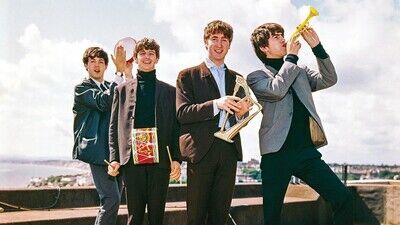A few years after Oliver Stone made “The Doors,” he released “Nixon,” which starred Anthony Hopkins as the disgraced 37th president. The Oscar-winning actor did the cursory work of changing his countenance and voice to appear more Tricky Dick-esque, but this was hardly an instance of someone “disappearing” into the role. In the film, he looks like Anthony Hopkins. But it didn’t matter that Hopkins didn’t resemble Nixon, because he took on the man’s volcanic anger and insecurity in such a way that he articulated Nixon’s essence. Eschewing the typical lookalike concerns, “Nixon” offered another way of thinking about Nixon—as an ambitious, fatally flawed but also oddly tragic and poignant figure destined to bring about his own ruin. As great as, say, Jamie Foxx is as Ray Charles in “Ray,” that performance was a facsimile of the celebrity we know—a perfect copy—whereas “Nixon” is arguably going for something more elemental than how he looked or sounded. One approach isn’t necessarily better than the other, but one is certainly given more respect in Hollywood. Put it this way: Foxx won the Oscar, and Hopkins did not.
That opportunity for discovery allows the actor the space to suggest his subject rather than impersonating them. Cillian Murphy somewhat resembles J. Robert Oppenheimer, but his Oscar-winning role in “Oppenheimer” benefited from the nuance he brought to understanding a complicated, tormented genius—it was a spiritual channeling more than a physical one. Will Smith doesn’t look like Muhammad Ali, but he understood the champ’s swagger, bringing a core element of himself to “Ali.” In “Spencer,” Kristen Stewart’s Princess Diana is as much Stewart as it is Diana—you can make the actress blonde, but you cannot hide the melancholy alienation she exudes in every role, which was crucial for the film’s depiction of an isolated woman in a gilded cage. Hopkins isn’t even the only great Nixon actor—Philip Baker Hall in “Secret Honor” doesn’t even try to recall the president’s features but digs deep into his rage and paranoia. Each of these performances (and so many others) confronts us with new ways of thinking about a famous figure we thought we knew. Rather than the comfort of familiarity, there’s the shock of the new.
I wish to take nothing away from actors who throw themselves into the process of becoming their subject. To use but one example, Meryl Streep’s Julia Child in “Julie & Julia” isn’t just an incredible imitation but also a lived-in portrayal of the beloved chef’s spirit and vulnerability. But I want to gently push back on our collective knee-jerk reaction to casting announcements, judging the choice almost solely on how similar the actor looks to the celebrity.
I’m not as familiar with Charlie Rowe’s work as I am with the other three actors tipped to play Beatles, but I like Dickinson, Keoghan, and Mescal a lot—it really shouldn’t matter how much they resemble their counterparts. Likewise, Timothée Chalamet shouldn’t be graded solely on how much he looks like Bob Dylan in the forthcoming James Mangold-directed biopic. Rather than expecting actors to perfectly mimic their real-life characters, we should ask them to enlighten us about those famous figure’s inner selves. Our fascination with iconic individuals is never skin-deep—why shouldn’t biopic performances be similarly penetrating?

